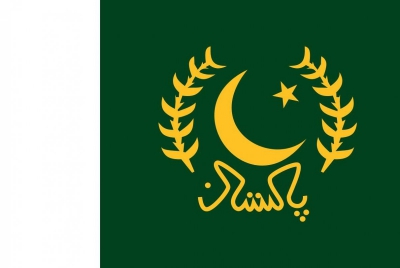Farooq Ahmad Khan Leghari (English IPA: fruk md lhr) (Balochi, Urdu: ; 29 May 1940 20 October 2010), was a Pakistani politician who served as the eighth president of Pakistan from 14 November 1993 until resigning on 2 December 1997. He is the first Baloch to have been elected as president.
Born into a Baloch tribal and influential feudal family, Leghari was educated at Aitchison College, the Forman Christian College in Pakistan, and St Catherine's College, Oxford in United Kingdom. Upon return from the UK, he sat for the Civil Services Exam in 1964 and started his career as a civil servant, remained commissioner sargodha division, prior to getting in to politics in 1973 and tenured as Senator representing the Punjab on the Pakistan Peoples Party (PPP) platform from 1975 to 1977. He contested the 1977 he won the National Assembly Elections on Pakistan People's Party ticket and was appointed Minister for Industries. In 1980s, he led demonstrations aimed against President Zia-ul-Haq's administration and successfully ran in general elections held in 1988. From 1990 to 1993, he worked under Benazir Bhutto as her deputy Leader of the Opposition and participated in the 1993 Pakistani general elections.
His credential and reputation eventually led him to secure a nomination for the presidency by Prime Minister Benazir Bhutto and was elected as President in 1993. However, he began receiving criticism over the controversial appointments of Senior Justices of the Supreme Court of Pakistan and was implicated in Mehran Bank scandal. Differences began to emerge with Prime Minister Benazir Bhutto on policy issues in 1995 and he surprisingly dismissed his leader's government in 1996. His political ambitions later clashed with Prime Minister Nawaz Sharif and his intervention to retain Justice Sajjad Ali Shah as Chief Justice finally led to his resignation in 1997. He remained active in politics starting his own Political Party "Millat Party" which was party of the "National Alliance" in the 2002 General Elections, the party merged into the PML(Q) in 2004. He was returned to the National Assembly in 2008 Elections. Leghari died from a long heart illness at the Combined Military Hospital in Rawalpindi on 20 October 2010.
The president of Pakistan (Urdu: صدر پاکستان, romanized: s̤adr-i Pākiṣṭān), officially the President of the Islamic Republic of Pakistan, is the ceremonial head of state of Pakistan and the commander-in-chief of the Pakistan Armed Forces.The office of president was created upon the proclamation of Islamic Republic on 23 March 1956. The then serving governor-general Iskander Mirza assumed office as the first president. Following the 1958 coup d'etat, the office of prime minister was abolished, leaving Presidency as the most powerful office in the country. This position was further strengthened when the 1962 Constitution was adopted. It turned Pakistan into a Presidential Republic, giving all executive powers to the president. In 1973, the new Constitution established Parliamentary democracy and reduced president's role to a ceremonial one. Nevertheless, the military takeover in 1977 reversed the changes. The 8th Amendment turned Pakistan into a semi-presidential republic and in the period between 1985 and 2010, the executive power was shared by president and prime minister. The 18th Amendment in 2010 restored Parliamentary Democracy in the country, and reduced presidency to a ceremonial position.
The constitution prohibits the president from directly running the government. Instead, the executive power is execrsised on his behalf by the prime minister who keeps him informed on all matters of internal and foreign policy, as well as all legislative proposals. The Constitution however, vests the president with the powers of granting pardons, reprieves, and the control over the military; however, all appointments at higher commands of the military must be made by the President on a "required and necessary" basis, upon consultation and approval from the prime minister.The president is indirectly elected by the Electoral College for a five-year term. The Constitution requires the president to be a "Muslim of not less than forty five (45) years of age". The president resides in an estate in Islamabad known as Aiwan-e-Sadar (President's House). In his absence, the chairman of Senate exercises the responsibilities of the post, until the actual president resumes office, or the next office holder is elected.
There have been a total of 13 presidents. The first president was Iskander Ali Mirza who entered office on 23 March 1956. The current office holder is Arif Alvi, who took charge on 9 September 2018, following his victory in the 2018 elections.

1996Nov, 5
Pakistani President Farooq Leghari dismisses the government of Prime Minister Benazir Bhutto and dissolves the National Assembly of Pakistan.
Choose Another Date
Events on 1996
- 10Feb
Garry Kasparov
IBM supercomputer Deep Blue defeats Garry Kasparov in chess for the first time. - 13May
Bangladesh
Severe thunderstorms and a tornado in Bangladesh kill 600 people. - 10Jun
Sinn Féin
Peace talks begin in Northern Ireland without the participation of Sinn Féin. - 4Sep
Revolutionary Armed Forces of Colombia
War on Drugs: Revolutionary Armed Forces of Colombia (FARC) attack a military base in Guaviare, starting three weeks of guerrilla warfare in which at least 130 Colombians are killed. - 25Nov
Florida
An ice storm strikes the central U.S., killing 26 people. A powerful windstorm affects Florida and winds gust over 90 mph, toppling trees and flipping trailers.

 English
English  español
español  français
français  português
português  русский
русский  العربية
العربية  简体中文
简体中文 